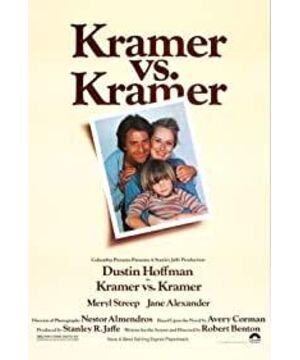The following is a reprint:
The cruelty of
marriage. When I was in college, a foreign teacher once played the film "The Kramers", which is said to have won multiple Oscars, in an audio-visual class, but I basically didn't understand it, and I still don't understand the plot so far.
no impression. Now that I picked it up again, I was in tears. Now and then, 23 years ago, I had never even tasted the taste of love, let alone marriage? There's one more thing I don't understand: When I was in graduate school, there were often older Ph.D. students who had married and told us when we were playing cards that it was nice that you were single. If you ask more carefully, they will tell you that this hand is really stinky. I was unfortunately still an old virgin at the time and didn't understand what was good about being single.
However, as there is a line in the movie "Moving the City, Farewell to Love": Marriage is brutal! This sentence is far more true than the empty promise that we will live happily ever after after marriage. Andrei in "War and Peace" went to war in order to escape the mundane marriage life. In the history of human beings, there have been endless wars, knowing that if they ran away, the horse leather might be wrapped in the corpse, or even become an unclaimed bone by the riverside, but there are still people going. For an idealist, what is more terrifying than being cannon fodder is to consume life by the trivialities of life.
There is a real difference between the pursuits of people and people. If we accept our differences and don’t try to change each other, we can barely get by, otherwise it will be really hard. I don't even know what the urgency is for the leftover women and bachelors. "Running in" may be something that can never be completed in a lifetime. I went to the house of an old professor who taught music yesterday. His wife runs a wedding dress business at home, and the old professor is very annoying. I don't even know how they fit together. On the way out I saw the secret. Their garage is not attached to the house, but in a separate place, across from the yard. There is a small room next to the garage. When the lady's client came to see the wedding dress, the old gentleman went to the house next to the garage to do his own business, and the two sides did not interfere with each other.
Many things in the world, including marriage, would be much easier if no one was involved. Human beings are such an odd animal that it is very difficult to cut them off with one stroke. Before the filming of "Mrs. Kramers", the director found Dustin Hoffman, and the film was almost tailor-made for him. But Hoffman was struggling with a divorce at the time. Compared with reality, he felt that the script was too superficial. Many women don't have empathy, they can't get through each other's situation, they only think about their own disappointments, and they don't think that the frustration of marriage can also hurt men a lot. Hoffman himself was walking in the valley of the shadow of death at that time, and it would be too cruel to take on this film. The first time I had an appointment with the director, he came down from the hotel room and went to the lobby. He didn't want him to have a long talk in the room, so he was ready to leave in a hurry. As a result, for the sake of spiritual healing, he took it. Before filming, he and the director lived in a hotel and polished the script together for a long time before shooting. This is the same thing as quitting smoking. Hiding a cigarette so that you can't find it is also quitting smoking. Some people put cigarettes everywhere, which is also a form of abstinence. Hoffman finally chose to face the various stimuli of the divorce topic, and used the filming of divorce to deal with the real divorce.
This film is about the raising of children after a failed marriage, and it involves almost all aspects of the placement of children in divorce: abandoning children, parenting, fighting for children and returning children. The film is based on the novel "The Kramers" by Avery Corman, best known for "The Kramers" and "50" published in 1987. These two works are full of talent, but the author did not do much later. One of the reasons may be that the priorities of the family's career and life have not been handled properly, and one has lost sight of the other. His wife is publisher Judy Corman, who brought Harry Potter to America. At the time of her death, she was a vice president of Scholastic. They have two sons, two people who are very successful in their careers together, and have children, and one has to make some sacrifices. In a family, if both husband and wife only care about themselves and refuse to compromise for the family, the unfortunate will be the children and then the whole family.
When the original author wrote "The Kramers" in the 1970s, the smoke of the feminist movement had not dissipated, and the topic of women going out to pursue their own was still very new. The heroine, Joanna, is also a highly educated woman. After marriage, she has a husband and a child at home, and she feels that she has lost herself. Her husband was so busy with work that she didn't pay enough attention to her, so she decided to leave her husband and run away from home. The film opens with a close-up of Joanna (Meryl Streep) as she emotionally says goodbye to her child as she is about to leave. Just looking at it from the facts, a woman is so cruel that even her children are willing to abandon her. If people make judgments, it is understandable. But three feet into the water, I saw a different scenery. When watching this film, I hope you will first dispel any prejudice about this woman being a jerk. Joanna is actually a mother. She loves children. When the children are out of school, she often goes to the cafe opposite to watch from a distance through the glass. She realized she was mentally unsound, the type that imploded in silence. She has already thought about it, and if she continues to stay at home, she will not only go crazy, but also affect the children. What she planned to leave was not material. Before leaving, she only took away the 2,000 yuan that she joined before marriage. She wanted to find herself.
Emotionally, most people may still be more sympathetic to their husbands who are both fathers and mothers. Teddy, played by Hoffman, finally understood the reason for his wife's departure. He blamed himself more and did not let the children resent their mother. In the film, he tells his son that when someone says sorry to you, don't hold grudges and make the other party feel uneasy for a long time. This father is a very responsible real man. This kind of quality is usually hidden, but when his wife runs away, it is all inspired. It may also lick the love of the calf and make him reborn. Later, in order to fight for a son, the husband and wife were merciless to Bo court. Although the lawyers quarreled with each other, these debates also upset their respective five-flavor bottles. The husband and wife really got to know each other after the divorce, but the damage was too much, and it was no longer possible to reunite.
The movie shattered many stereotypes about the roles of couples and parents. Teddy's speech in the court debate is very classic. He said he could understand housewives going out to find themselves, and he could accept that. If society can break this stereotype, why not break the fallacy that mothers must be better "parents"? After the screening of "The Kramers", Teddy's questioning forced the whole society to rethink the role of parents, which even changed the thinking of many judges in the marriage court. In divorce cases, the still young children are often sentenced to the mother, and the father only sends money to support them, leaving only obligations and few visits, so they cannot fully enjoy the family happiness between father and son. In the film, the child was indeed sentenced to the mother, which was a portrayal of the social reality at that time. Now, children don't necessarily all go to their mothers. The qualities of "permanence" (including whether a relationship can last for a long time) and "constancy" (including occupational stability), which are repeatedly mentioned by the male lawyer in the film, can affect the judge's decision more than simple gender differences. judgment. The judge is more concerned with which side is best for the child to grow up. This change is also due to the film. It is also possible for a mother to face Qin Muchu and make her child feel insecure. When thinking of the failure of marriage, people tend to think of the husband's reasons, such as eating, drinking, prostitutes, gambling, work, and family. It's a fact that these people exist, but don't forget that irresponsible women abound. They put all the responsibility for the failure of relationship management on the man, blame the man for lack of love and attention to themselves, and so on, forming too high expectations for their husbands, but do not make demands on themselves. Women can also be the main reason for relationship failure.
There are no bad people in marriage. Both husband and wife may be good mothers, good fathers, or even good people, but it is not uncommon for the two to not get along together. It is hard to establish a distance and it is hard for the child, which deduces countless joys and sorrows. At the end of the film, the mother who won the lawsuit, considering that the home created by the father is more beneficial to the child, took the initiative to return the child to the father, which can be said to be a small reunion among disunity. This result is artistically good, but realistically it is too romanticized. Most of the divorces and breakups are very ugly. The fight for property and children is full of ugliness. Outsiders can't stand the trouble, but no one can intervene. Any decision is painful. Divorce is like an amputation operation. No matter how successful the operation is, if the arm is missing or the leg is missing, this defect is lifelong and cannot be repaired. It can solve some problems, such as finally no need to pay attention to the spouse's family, but it also creates many new problems, such as child rearing. These new problems are not necessarily easier to solve than the old ones, and every family is different, so there is no experience to learn from. Marriage is a road of no return, and it really cannot end until death. The only relief may be to become indifferent. The opposite of love is not hate, but indifference. But once adults start to be indifferent, children may follow suit and end up being cynical and lacking in the ability to love. So there is almost no surefire way to do this, and no matter what the outcome is, it will hurt. If you're getting a divorce, it's best before you have kids. After having a child, it is handled very well, but after all, it is rare.
Knowing that the divorce results are chaotic, the divorce rate in the United States is still very high, and even half of the marriages end in failure. They are not easy to live with, to settle for, and to make do. When a tooth is broken, Chinese dentists will not extract it unless it is absolutely necessary, because they believe that teeth and appetite are closely related to the rest of the body, and their parents should not be neglected. American dentists are very aggressive and tend to ask you to pull out when you can or not, lest the bad teeth affect the whole body and quality of life. This kind of thinking is also reflected in marriage and family. For low-quality marriages, most of them choose to end them and find a new life. At this time, the placement of the child has become the biggest problem in the middle.
After years of economic survival in China, people place too much importance on the sense of security brought by material things. Now, even if the problem of survival is solved, most people still put material things above everything else, and are sloppy in other aspects. When it comes to divorce, such as I read a lot of comments about Li Yang's divorce not long ago. The first thing people mentioned in the comments was the division of property. When Americans divorce, they are more concerned about taking care of children's mental health, which is bigger than anything else in divorce. I think they did the right thing. If you destroy the hearts of children, what can you do if you win gold and silver? One can live a lifetime, and even the happiness and tranquility of children can be ignored. What is the difference between living and walking dead? Divorced children often blame themselves, suspecting that their mistakes or inadequacies caused the breakdown of their parents' marriages. The father played by Hoffman in the film is very responsible and dispels the child's concerns in this regard. Teddy's grievance is great, but after all, adults are more capable of dealing with misfortune. It is too cruel to let a child deal with a problem that is not commensurate with his mind. Teddy adamantly refused to let the child go to court to answer questions. In addition, during the divorce process, the husband and wife are noisy and hateful, and the children are very embarrassed. One side is the father and the other is the mother. Who do you want them to choose? There are also scumbag parents who let their children be spies in the process, inquire about each other's actions, or let their children be messengers to pass messages, and those who force their children to do such things are really not worthy of being parents, or even human beings. Provoking a child to hate each other or the other's family in order to win the love of the child is immoral and rational. There will always be a day when children will understand, and they will despise such selfishness and smallness of their parents.
Being a parent, being a parent, is a very big responsibility. A person who only cares about himself and only expects others to take care of himself, and does not intend to take care of or care about others, single is a better choice. Cultivating qualified parents is what a nation should focus on. It is far more important than filial piety. At the same time, marriage is already fragile enough. If the big family cannot take care of the small family and let it develop harmoniously and healthily, it is also the elders' irresponsibility. Generations come and go, and human beings always have to move forward.
View more about Kramer vs. Kramer reviews











